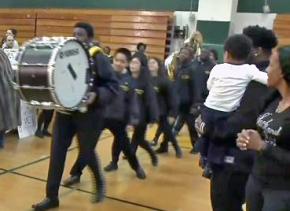Celebrating King’s legacy of solidarity
reports on an MLK celebration in Rockland County, New York.
SOME 1,000 community members and activists celebrated Dr. Martin Luther King Jr.'s legacy at a unity celebration honoring him on January 18 at Ramapo High School in Rockland County, New York. The focus of the event was Black Lives Matter and income and educational inequality.
Organized by International Socialist Organization (ISO) member Marc Pessin, the event inspired those gathered to continue the struggle for justice and equality by getting involved in social justice activism.
Pessin said that over 130 organizations from all areas of working-class life in Rockland sponsored the event, and set up tables in the gym. The MLK Celebration Committee zeroed in on inviting organizations that service oppressed groups in Rockland and nationally to show the interconnectedness and solidarity necessary to win in the fight against oppression.
In addition to Black organizations, Los Padres Unidos (a Latino parent group fighting for better schools), the Teachers Association, the Rockland Water Coalition and the Sierra Club were present. Hudson Valley Planned Parenthood and Rockland County Pride tested and counseled individuals who took HIV tests.

The Jerrahi Mosque, the Jewish Federation of Rockland County and several Christian churches attended, showing solidarity and opposition to the persecution of Muslims. Haymarket Books and the ISO were key sponsors. Entertainment included spoken word, gospel, African dance, marching band, and hip-hop.
Dr. Weldon McWilliams IV, the keynote speaker, spoke on how to carry out King's legacy in today's political climate. Emphasizing King's lack of popularity, his antiwar and radical stances that "we were never supposed to know, and certainly never revere," he reminded us that today, Dr. King would still not be popular with those in power.
McWilliams spoke of the growth of income inequality in the U.S. over the last 40 years and the need for a massive redistribution of wealth, even calling upon the Black community to boycott companies and corporations whose values and actions did not line up with the goals of Spring Valley's Black community. He also spoke of the need to fight for public education in Spring Valley and of wrenching away the power of a corrupt school board by Spring Valley's citizens.
McWilliams ended with a comparison between Ferguson, Missouri, and Spring Valley, in which he cited the segregation and gentrification of Ferguson that has been replicated in the context of Spring Valley. In all, the event was a tremendous success and helps lay the basis for unifying the organizations necessary to fight racism, inequality, homophobia and Islamophobia in Rockland.


